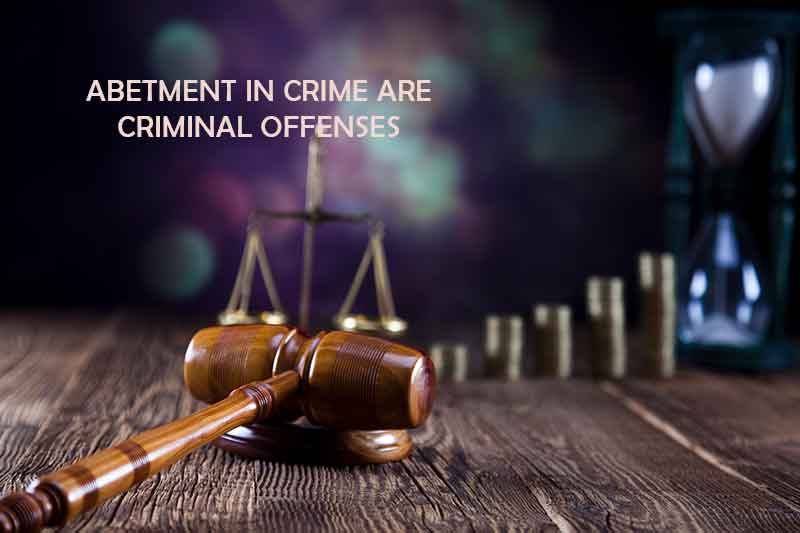The United Arab Emirates maintains a steadfast position on holding individuals accountable for criminal acts, encompassing not only the direct perpetrators but also those who aid or abet in the commission of unlawful activities. The concept of aiding and abetting entails the intentional facilitation, encouragement, or assistance in the planning or execution of a criminal offense. This legal principle ascribes culpability to individuals for their conscious involvement, even if they did not directly perpetrate the crime themselves. Within the UAE’s legal framework, aiding and abetting can result in severe penalties, often commensurate with the punishments prescribed for the principal offense.
Garnering a comprehensive understanding of the ramifications associated with this principle is of paramount importance for residents and visitors alike, as inadvertent actions or omissions can potentially implicate them in criminal proceedings, necessitating a thorough grasp of the relevant legal provisions.
What Constitutes Aiding and Abetting a Crime under UAE Law?
The United Arab Emirates’ current Penal Code, Federal Decree-Law No. 31 of 2021 [On the Issuance of the Crimes and Penalties Law], provides the legal definition of what constitutes aiding and abetting a crime. According to Articles 45 and 46 of this law, a person is considered an accomplice if they intentionally and knowingly assist or facilitate the commission of a criminal act.
Intention and knowledge of the crime are crucial factors in determining accomplice liability under UAE law. Mere presence at the scene of a crime, without active participation or intent to aid the perpetrator, does not automatically constitute aiding and abetting. The extent of an accomplice’s involvement dictates the severity of the penalty they face. Article 46 states that an accomplice may receive the same penalty as the perpetrator or a lesser punishment, depending on the specific circumstances and their level of participation in the criminal act.
Some examples of actions that could constitute aiding and abetting under UAE law include providing weapons, tools or other means to commit the crime, encouraging or instigating the perpetrator, assisting in the planning or execution stages, or helping the perpetrator evade justice after the fact.
It is important to note that the legal interpretations and applications are ultimately at the discretion of UAE judicial authorities on a case-by-case basis.
Eleman nan ankouraje
Pou yon zak kalifye kòm enkourajman, de eleman kle yo dwe satisfè:
- Actus Reus (Lwa koupab): Sa refere a aksyon espesifik enstigasyon, angajman nan konplo, oswa èd entansyonèl. Actus reus se eleman fizik yon krim, tankou zak ankouraje yon moun pou fè yon vòl oswa bay li mwayen pou fè sa.
- Mens Rea (Lespri koupab): Akouchman an dwe gen entansyon pwovoke, ede, oswa fasilite komèt yon ofans kriminèl. Mens rea refere a eleman mantal yon krim, tankou entansyon pou ede yon moun komèt yon zak kriminèl.
Anplis de sa, jeneralman pa gen okenn egzijans pou krim enkouraje a aktyèlman fèt avèk siksè pou responsablite anba lwa enkourasyon. Yo ka pouswiv moun k'ap fè patipri a sèlman dapre entansyon yo ak aksyon yo pou ankouraje krim lan, menm si krim nan tèt li pa t janm fini.
Kalite oswa Fòm Ankourajman
Gen twa fason prensipal la krim ankourajman ka rive:
1. Enstigasyon
Defini kòm dirèkteman oswa endirèkteman pou mande, pwovoke, ankouraje, Oswa mande yon lòt moun pou komèt yon krim. Sa ka rive atravè mo, jès, oswa lòt mwayen kominikasyon. Enstigasyon mande patisipasyon aktif ak entansyon kriminèl. Pa egzanp, si yon moun repete di zanmi l pou l vòlè yon bank epi li bay plan detaye sou fason pou l fè l, li ka koupab pou l te pwovoke krim nan, menmsi zanmi an pa janm swiv vòl la.
2. Konplo
An akò ant de oswa plis moun pou komèt yon krim. Souvan konsidere kòm la fòm ki pi grav nan ankouraje, konplo egzije sèlman akò a, kèlkeswa nenpòt lòt etap oswa aksyon yo pran. Yon konplo ka egziste menm si moun yo pa janm aktyèlman fè krim ki te planifye a.
3. Èd entansyonèl
Bay asistans oswa resous tankou zam, transpò, konsèy ki entansyonèlman ede nan yon zak kriminèl. Èd entansyonèl mande konplisite aktif ak entansyon. Responsablite aplike menm si akouchman an pa prezan fizikman sou sèn krim lan. Pou egzanp, si yon moun fè konnen prete machin yo bay yon zanmi pou itilize nan yon vòl ki planifye, yo ta ka koupab nan entansyonèlman ede krim nan.
Difference between Abettor and Offender
| Abettor (Accomplice) | Offender (Perpetrator) |
|---|---|
| An abettor or accomplice is an individual who intentionally aids, facilitates, encourages, or assists in the planning or execution of a criminal act. | An offender, also known as a perpetrator, is the individual who directly commits the criminal act. |
| Abettors do not directly commit the crime themselves but knowingly contribute to its commission. | Offenders are the principal actors who carry out the unlawful act. |
| Abettors can be held liable for their role in supporting or enabling the crime, even though they did not personally carry it out. | Offenders are primarily responsible for the criminal offense and face the full extent of the prescribed punishment. |
| The level of involvement and intent determines the extent of an abettor’s culpability and punishment, which may be equal to or lesser than the offender’s. | Offenders typically receive the maximum penalty for the committed crime, as they are the direct perpetrators. |
| Examples of abetting actions include providing weapons, tools, or assistance, encouraging or instigating the crime, aiding in planning or execution, or helping the offender evade justice. | Examples of offender actions include physically committing the criminal act, such as theft, assault, or murder. |
| Abettors can be charged as accomplices or co-conspirators, depending on the specific circumstances and their level of involvement. | Offenders are charged as the principal perpetrators of the crime. |
This table highlights the key differences between an abettor (accomplice) and an offender (perpetrator) in the context of criminal acts, based on their level of involvement, intent, and culpability under the law.
Punishment for Abetting a crime in UAE
According to the UAE Penal Code (Federal Decree-Law No. 31 of 2021), the punishment for abetting a crime depends on the nature of the abettor’s involvement and the specific crime they aided or abetted. Here’s a table outlining the potential punishments based on different types of abetment:
| Primary Type | Deskripsyon | Pinisyon |
|---|---|---|
| Instigation | Deliberately encouraging or urging another individual to engage in criminal conduct. | Equivalent to the penalty imposed on the principal offender if the instigator was aware of the intended crime (Article 44 of the UAE Penal Code). |
| Konplo | A premeditated agreement among two or more parties to carry out an unlawful act. | Conspirators are generally subjected to the same punishment as the main perpetrator. Nonetheless, the judge retains discretionary power to reduce the sentence (Article 47 of the UAE Penal Code). |
| Intentional Aiding | Knowingly providing assistance or support to another person with the understanding that they plan to commit a crime. | The severity of the penalty varies, contingent upon the gravity of the offense and the degree of assistance rendered. Punishments can range from monetary fines to incarceration (Article 48 of the UAE Penal Code). |
What are the defenses Against Abetment Charges in UAE
Pandan ke ankouraje yo konsidere kòm yon ofans grav, plizyè defans legal egziste ke yon avoka ki gen eksperyans defans kriminèl ka anplwaye:
- Mank entansyon oswa konesans obligatwa: Si akouchman an pa t gen entansyon ede oswa ankouraje krim lan, oswa li pa t konnen nati kriminèl aksyon yo, sa ka bay yon defans.
- Retrè nan konplo kriminèl la: Si akouchman an te retire nan konplo a anvan krim lan te komèt epi li te pran mezi pou anpeche ensidan li a, sa ka anile responsablite.
- Reklame kontrent oswa kontrent: Si yo te fòse akouchman an ede oswa ankouraje krim nan anba menas mal oswa vyolans, sa ka sèvi kòm yon defans.
- Demontre echwe kòz pwòch ant aksyon ak krim: Si aksyon enkourajman an pa t 'dirèkteman kontribye nan komèt krim nan, sa ka febli ka pouswit jidisyè a pou etabli responsablite.
- Mistake of fact: If the abettor had a reasonable belief that the act they aided or abetted was not illegal, based on a mistake of fact, this could provide a defense.
- Entrapment: If the abettor was induced or entrapped by law enforcement to aid or abet the crime, this could potentially serve as a defense.
- Statute of limitations: If the prosecution of the abetment charge is brought after the legally prescribed time limit or statute of limitations, this could result in dismissal of the case.
Konprann estrateji potansyèl yo epi sèvi ak presedan jurisprudence yo se kle pou bati yon defans efikas kont akizasyon ankouraje.
konklizyon
Krim nan enkourajman pa ta dwe pran alalejè nan UAE yo. Ankouraje, ankouraje, oswa ede nan nenpòt zak kriminèl pote penalite sevè, menm si krim nan li menm pa te janm fèt avèk siksè. Yon bon konpreyansyon sou eleman espesifik yo, kalite enkourajman, lwa pinisyon, ak potansyèl defans legal esansyèl pou tout sitwayen UAE pou evite mele ak lwa konplèks sa yo. Konsilte yon avoka defans kriminèl ki gen eksperyans byen bonè ka vle di diferans ki genyen ant pase ane nan prizon oswa evite pouswit totalman.
Si yo te envestige w, arete w oswa akize w pou yon ofans kriminèl ki gen rapò ak enkourajman nan UAE, li enpòtan pou w chèche konsèy legal imedyatman. Yon avoka ki gen konesans ka gide w atravè pwosesis legal la, pwoteje dwa w, epi asire pi bon rezilta posib pou ka w la. Pa eseye navige nan konpleksite lwa enplikasyon yo poukont ou - kenbe reprezantasyon legal pi vit posib.
Legal ou konsiltasyon avèk nou pral ede nou konprann sitiyasyon ou ak enkyetid ou yo. Kontakte nou pou w planifye yon reyinyon. Rele nou kounye a pou yon randevou ijan ak reyinyon nan +971506531334 +971558018669

